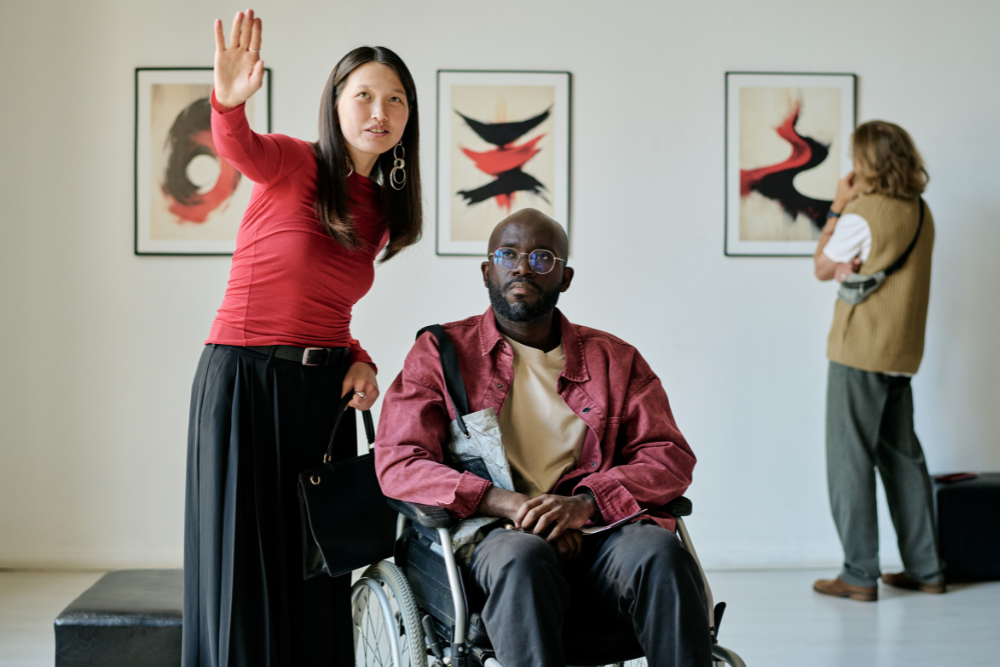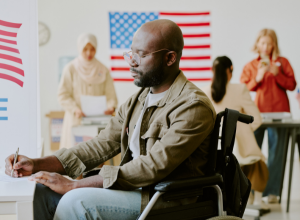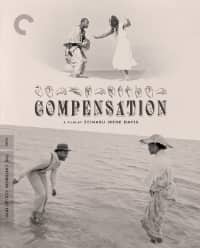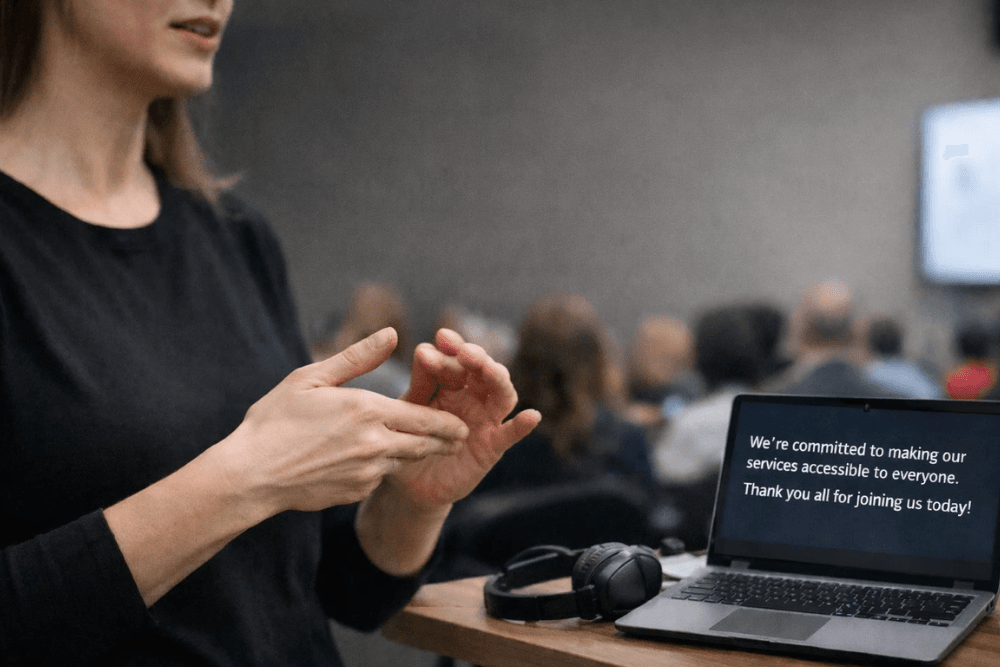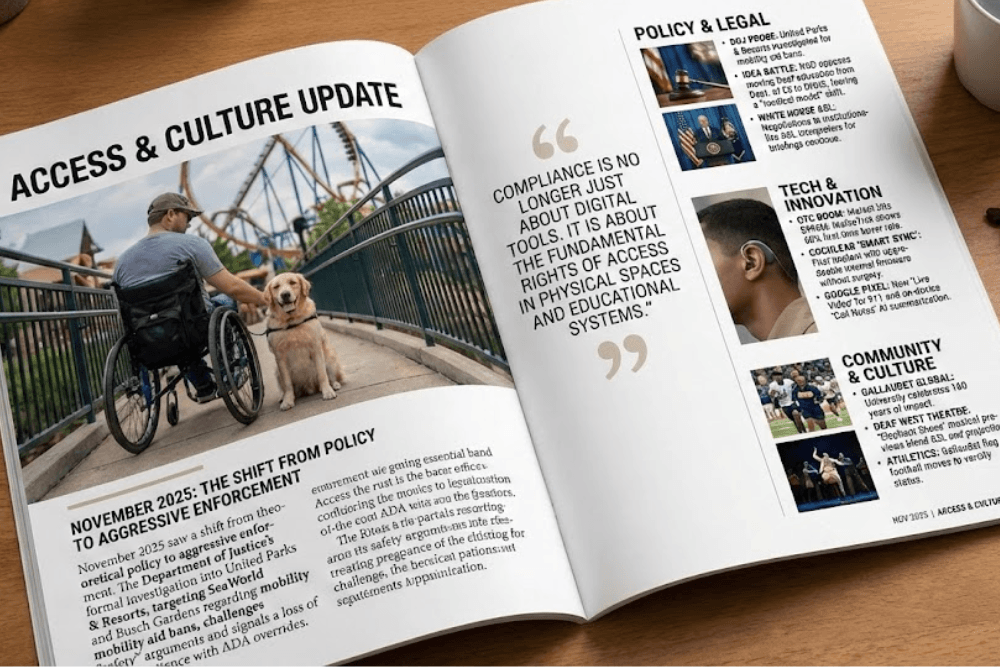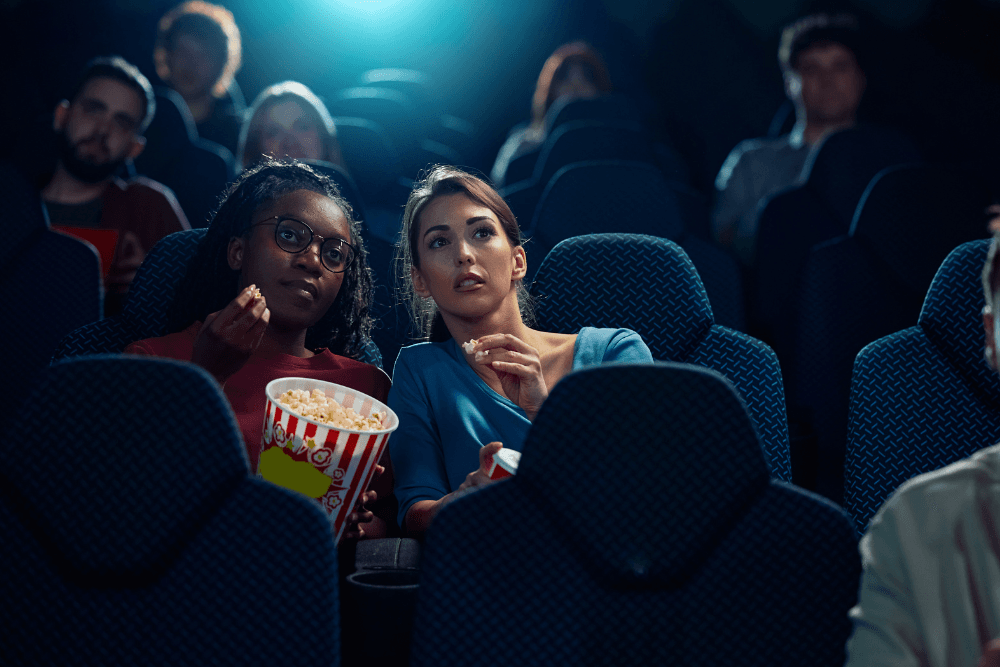This week, the Deaf community finds itself at a crossroads of remarkable cultural achievements and troubling policy setbacks. This week’s news highlights the ongoing struggle for true accessibility and representation, from groundbreaking media milestones to devastating cuts in essential services. These stories remind us that progress isn’t linear, and that advocacy remains as crucial today as it was 35 years ago when the ADA was signed into law.
Here’s a roundup of the week’s most significant developments affecting Deaf and Hard of Hearing communities across the globe.
ADA Anniversary Prompts Rights Defense Call
Marking the 35th anniversary of the Americans with Disabilities Act, prominent Deaf writer Rachel Kolb issued an urgent call to action in the Los Angeles Times, warning of emerging threats to hard-won disability rights. The op-ed reflected on how the ADA transformed lives by opening doors to education and careers previously inaccessible to the Deaf community, while highlighting current challenges that risk undoing decades of progress.
The writer pointed to recent budget cuts and policy rollbacks as evidence of a concerning “backslide” in disability rights enforcement. She noted that despite the ADA’s promise of equal access, many Deaf individuals still face significant barriers in employment, education, and healthcare. The anniversary serves as both a celebration of historic achievements and a sobering reminder that rights once won require constant vigilance to maintain.
The piece emphasizes the responsibility of the “ADA generation” (those who have directly benefited from the law’s protections) to become active defenders of accessibility. With interpreter shortages worsening and funding for disability services under threat, the writer argues that passive appreciation for past gains is insufficient. Instead, she calls for renewed activism, urging readers to contact legislators, support disability organizations, and share their stories to illustrate the ongoing importance of the ADA. The message resonates beyond the Deaf community, reminding all Americans that civil rights progress is never permanent without sustained advocacy.
UK Launches First BSL Emergency Alert System
The UK Cabinet Office achieved a historic milestone in accessible public safety by releasing the nation’s first British Sign Language (BSL) video explaining the Emergency Alerts system.
This initiative helps Deaf citizens receive critical safety information in their primary language during emergencies, addressing a long-standing gap in disaster preparedness communications.
The BSL video accompanies a planned test of the UK’s Emergency Alerts system, which sends notifications to mobile devices during life-threatening situations. Previously, Deaf individuals relied solely on text messages or secondhand information during emergencies, creating dangerous delays in receiving vital safety instructions. The new BSL resources provide clear, visual explanations of how the system works, what the alerts mean, and how to respond appropriately during various emergency scenarios.
Gallaudet Athletic Director Selected for TED Talk
Warren Keller, Gallaudet University’s Athletic Director, will speak at the inaugural TED Sports event “Game Changing Ideas in Sports” in Indianapolis this September. This selection marks a significant moment for Deaf representation on one of the world’s most prestigious speaking platforms, offering an unprecedented opportunity to reshape mainstream perceptions of Deaf contributions to athletics.
Keller’s presentation will highlight how Deaf athletes and institutions have pioneered innovations that benefit all sports participants. Most notably, he’ll discuss the invention of the football huddle at Gallaudet (a strategy developed to prevent opposing teams from reading signed plays that revolutionized how the game is played worldwide). His talk promises to reframe the narrative from accommodation to innovation, showcasing how Deaf perspectives drive creative solutions that enhance sports for everyone. His selection for TED Sports validates decades of Deaf athletic excellence and positions Gallaudet as a modern hub of sports innovation. As major sports leagues increasingly focus on accessibility and inclusion, Keller’s platform provides a timely opportunity to demonstrate that Deaf culture doesn’t just adapt to sports; it actively improves them. Sometimes the best ideas come from those who see the game differently.
Indiana Eliminates Only Public ASL Program
Indiana University Indianapolis dealt a devastating blow to Deaf accessibility by eliminating the state’s only public university ASL-English Interpretation program. The decision, driven by budget cuts affecting multiple departments, ends the sole affordable pathway for training certified interpreters in a state already facing a critical shortage of qualified professionals.
The timing amplifies the crisis: approximately 60% of Indiana’s working interpreters approach retirement age, creating an impending cliff in available services. Without this program producing new graduates, Deaf Hoosiers face increasingly limited access to healthcare, education, legal services, and employment opportunities. The ripple effects are already visible: Deaf patients report relying on emergency rooms for routine care because ERs must legally provide interpreters while private practices often cannot secure them.
Rural and economically disadvantaged communities bear the heaviest burden. Students who might have pursued interpreter training through this affordable public option now face expensive private alternatives, creating economic barriers precisely when demand peaks. Advocates warn this isn’t just an educational cut but a civil rights crisis in the making. As one advocate noted, “You can’t exercise your ADA rights without interpreters to facilitate communication.” The program’s closure effectively tells Indiana’s Deaf community that their access to basic services is expendable, a message that contradicts the very principles of equal access the ADA was designed to protect.
TCM Features Deaf Actress in Prime Time
Turner Classic Movies made television history by featuring “Compensation” during primetime hours, showcasing Deaf actress Michelle Banks in a leading role. The 1999 drama, directed by Zeinabu irene Davis, tells parallel love stories across different time periods, with Banks portraying a Deaf woman navigating romance and cultural identity in early 20th century Chicago.
This programming decision represents a significant shift in mainstream media recognition of authentic Deaf representation. Unlike the common practice of casting hearing actors to “perform” deafness, “Compensation” features a Deaf actress bringing lived experience to her role. Banks’ performance captures the intersections of Deaf identity, gender, race, and class through organic signed and visual storytelling techniques that hearing actors simply cannot replicate.
The primetime slot signals institutional validation of Deaf cinema as culturally significant American film. TCM’s platform introduces classic films to new audiences, and their choice to feature “Compensation” during peak viewing hours suggests growing industry awareness about authentic casting. This broadcast coincides with broader entertainment industry conversations about representation, potentially opening doors for more Deaf actors in mainstream productions. The timing couldn’t be better: as Hollywood grapples with diversity initiatives, showcasing successful Deaf-led films from the past provides a roadmap for future inclusive storytelling.
Looking Ahead
This week’s news reveals a complex landscape where cultural victories and infrastructure losses exist side by side. While mainstream platforms increasingly recognize and celebrate Deaf talent and contributions, the fundamental services that enable daily access continue to face budget axes. The contrast between TCM’s primetime celebration of Deaf cinema and Indiana’s elimination of interpreter training couldn’t be starker.
As we move forward, these stories remind us that true inclusion requires more than representation in media or inspirational TED talks. It demands sustained investment in the infrastructure of accessibility: interpreter training programs, emergency alert systems in sign language, and unwavering commitment to the principles of equal access. The ADA’s 35th anniversary isn’t just a moment for reflection; it’s a call to action for all of us who believe in a truly accessible society.

